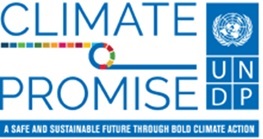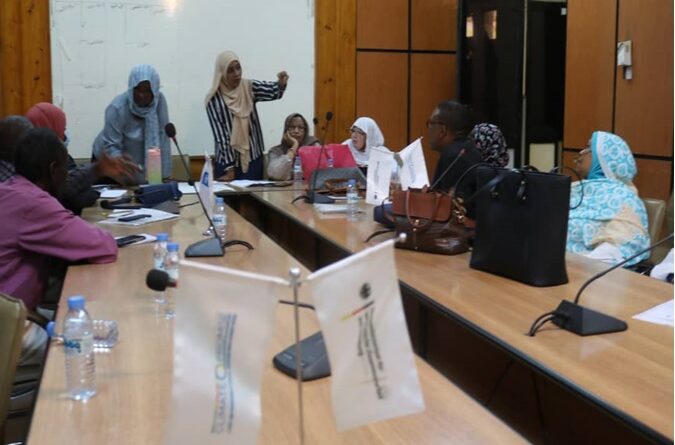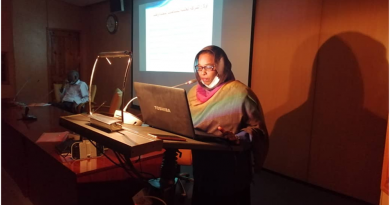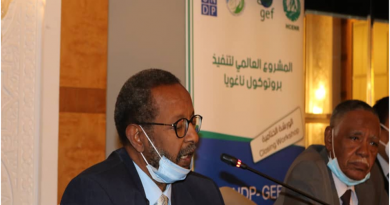Sudan is gearing up for the implementation of NDCs.
The climate plays a key role in human development and insecurity and is expected to do so even more in future. According to the Intergovernmental Panel on Climate Change (IPCC) climate change is “any change in climate over time, whether due to natural variability or as a result of human activity”. Unfortunately, Africa is “one of the most vulnerable continents to climate variability and change because of multiple stresses and low adaptive capacity. Focusing in Sudan, the impact of climate change continues representing significant threat to livelihoods, food security and sustainable development. These threats are compounded by widespread conflicts and a macroeconomic crisis.
The extreme increases in temperature, unpredictability of seasonal rains and frequency of drought, had led to lower than ever rates in the production and productivity of the livestock and agriculture sectors. These threats result in shifting migration patterns in Sudan causing unreasonable use and control of a limited resources.
Looking at the whole picture, the impact of climate change is taking either more or less aggressive forms in all world countries. That’s why an urgent action plan with targets and long-term goals had to be made and implemented by everyone not only for mitigating the greenhouse gas emissions cut emissions and adapt to climate impacts, but also to define how to reach the targets, and elaborate systems to monitor and prove progress so it stays on track for a long time. This plan was named “National Determinant Contributions (NDCs) or as it called “the heart of the Paris Agreement”.
NDCs symbolize efforts by each country to reduce national emissions and adapt to the impacts of climate change. The article 4, paragraph 2 in Paris Agreement requires each Party to prepare, communicate and maintain successive nationally determined contributions (NDCs) that it intends to achieve.
Sudan prepared and submitted the first NDC to the UNFCCC secretariat in Oct 2015, the sublimation of Sudan’s nationwide multi-sectoral NDC document was in response to the calls under article.4.11 of the Paris Agreement that follow the guidance of Least Developed Countries (LDCs) with the main objectives of (I) updating and resubmitting an enhanced version of the document; (ii) developing the necessary institutional infrastructure, capacities, and funding strategies for the NDC implementation, integration, and reporting. However, the first updated NDC of Sudan has made to the response to the call under Article 3, 4.2, 4.6, Art.4.11 of PA and particular of decision 4/CMA.1, para 7 of the 24 to Conference of Parties. The document consists of two major components that composes of different sectors to achieve the overall goals of the NDCs. Those are (i) the mitigation component, concerning the energy, forestry, land use, and waste sectors; and (ii) the adaptation component, concerning water, agriculture, health, and coastal zone sectors.
4 overall objectives were set of the NDCs are:
– To reduce the greenhouse gas emissions and adapt to the impact of climate change and variability through
– To strengthen and mobilize the effort and resources of the nation in support of the Plan.
– To promote common economic policies in all vital spheres.
– To ensure the balanced and rapid development of all parts of the country.
In the last updated submission of NDCs, Sudan has prioritized actions on climate change adaption planning with the objectives of building resilience. The updated NDCs measures for that are high risks from the current projected impacts of climate change namely: agriculture, water, health, and coastal zone with clear aim to promote sustainable development that improves adaptive capacity and limit growth of GHGs emissions through integration of climate change issues and concerns into national policies, strategies and development plans.
Climate Promise 2 supporting Sudan in Creating enabling environment to achieve its targets.
The Climate Promise 2 under the flagship of UNDP, has been committed to supporting Sudan in preparation of 2015and furthering its implementation, thus creating an enabling environment, to access international finance and technical support . This support would enable Sudan to transition its development sectors into a more resilient and low emission pathway, in line with the objectives of the PA and the national development priorities. As such, during quarter (1) of 2023 Climate promise2 supported Sudan completing the following activities.
2015and furthering its implementation, thus creating an enabling environment, to access international finance and technical support . This support would enable Sudan to transition its development sectors into a more resilient and low emission pathway, in line with the objectives of the PA and the national development priorities. As such, during quarter (1) of 2023 Climate promise2 supported Sudan completing the following activities.
- Review and assess gaps and barriers in the national policies, strategies, plans, and legal frameworks related to NDC implementation, and assess opportunities at a policy level to improve the enabling environment for NDC implementation.
- Conduct consultations to discuss revisions needed in regulatory, policies and planning frameworks for NDCs preparation and implementation and design recommendations to improve enabling environment.




